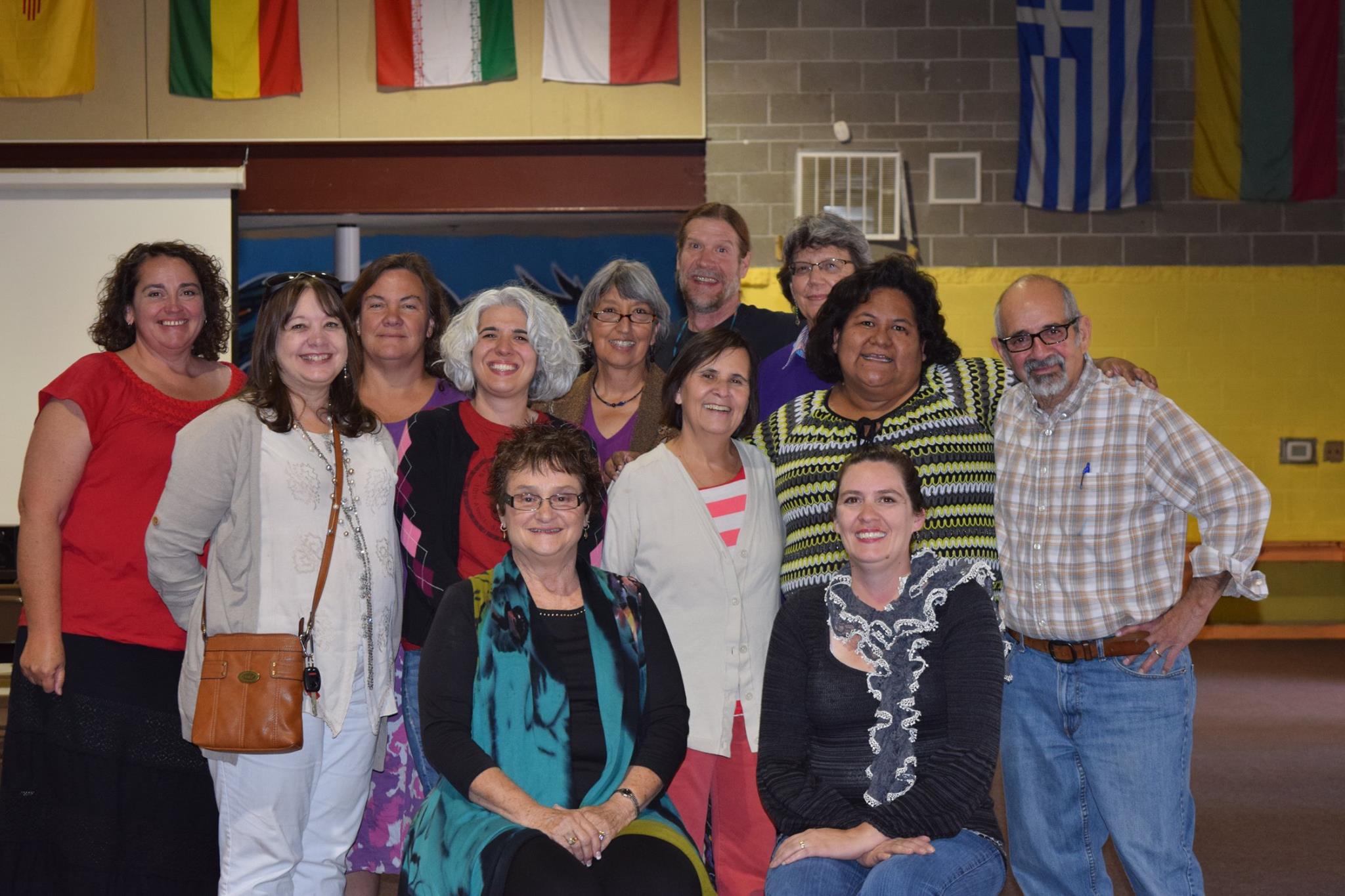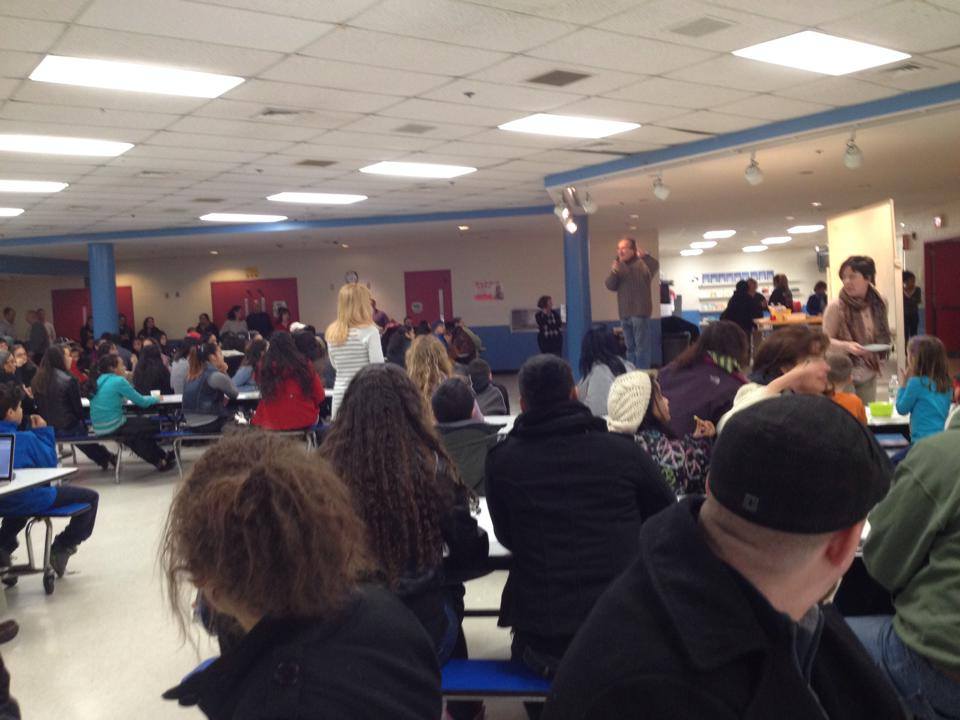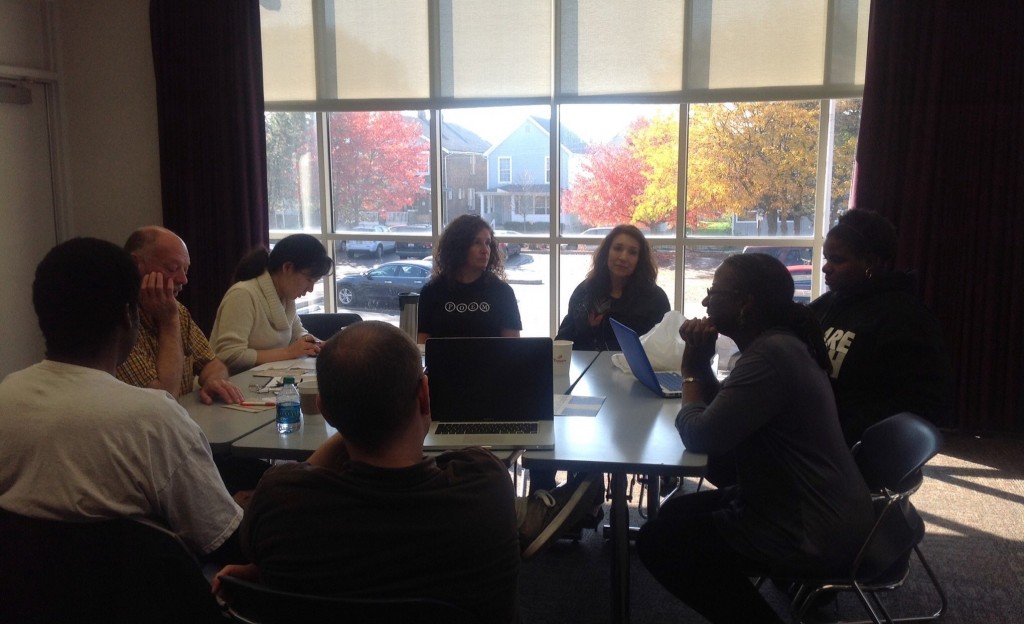BLTN Regional Meeting Round-up
0December 14, 2014 by Tom McKenna
Andover Bread Loaf and Students at the Center Partner in New Orleans
On December 6, 2014, Andover Bread Loaf (ABL) and Students at the Center (SAC) collaborated with the United Teachers of New Orleans and Transplanted Educators for Justice for a three-hour professional development conference in New Orleans. Lou Bernieri reports, “Eighty people showed up, including 20 from Baton Rouge. Teachers, high school, college, graduate students, a couple of professors and community organization staff participated. The conference focused on liberatory writing pedagogies and on teachers, youth, and communities becoming producers, and not just consumers of educational reform. It was intense and inspiring, transformative and revolutionary. It was the beginning of an ABL/SAC long term educational plan in New Orleans public schools. (We believe the design and content of professional development should include students as active participants. )” In addition, it was the beginning of a New Orleans-Baton Rouge partnership focused on youth and communities.
The partnership also organized the NOBLE (New Orleans Bread Loaf Experience) conference that same Saturday, which they dubbed “Superhero Saturday.” Again, Bernieri reports: “Fifty-five kids, eight Student At the Center writing leaders, 12 adults. About 30 parents came at the end for the open mic. Prompts were about being a superhero and superhero powers. Last prompts were about regular people in your community who are superheroes and what kind of regular superhero do you want to be. ‘What will you do as that superhero?’ Responses included lots of moms, doctors, nurses, firemen, etc. Among the most powerful pieces of writing for the day was that of a 3rd grader who wanted to be ‘Wordman’ a superhero who would use his superpowers to eliminate bad words like ‘racism’ and replace them with positive words and by doing so make the world a better place for everyone. There were easily 100 shares, probably more. Amazing day! Props to Ashley Jones, Rebecca Radding, Sam Gordon, Mosi Makori, and Julie Wedding for all their work organizing the event. Many kids asked if we could do one every Saturday! Three hours of writing and sharing on a Saturday.”
BLTN Teachers from Arizona, Colorado, and New Mexico Gather in Santa Fe

BLTN New Mexico: Front row: Vicki Hunt and Anissa Shaver; middle row: Lauren “Ren” Thomas, Alicia Fritz, Susan Miera, Laura Jagles, Alfredo Luján; Back Row: Crystal Ergish-Wood, Melinda Merriam, Juanita Lavadie, Phil Sittnick, Vicki Holmsten
BLTNers de New Mexico were hosted by Alfredo Lujan in Santa Fe October 25, 2014. Notes compiled by Melinda Merriam, including some very colorful reflections–like Alfredo’s below–make a great read for those interested in the history and contemporary state of BLTN New Mexico.
“Face to face meetings trump Skype, conference calls, and any other type of electronic communication. Sure, staying in touch through BreadNet and Facebook and telephone is better than nothing. But sitting at a table together … shaking hands, sharing abrazos, seeing each other, smelling each other…I mean smelling each other the way one smells the ball in a basketball game … or the way you smell a book or dictionary when you open it … and breaking bread (pun almost not intended) with each other always beats the click.” – Alfredo Luján
Buckeye Bread Loaf Meets in Columbus
On October 25, 2014, Buckeye Bread Loaf members met at the Columbus Metropolitan Library to discuss teaching, collaboration plans and network events. From bottom center, clockwise: Chris Moore, David Wandera, Gary Metzenbacher, Se Jeong Yang, Vivian Axiotis, Marilou De Sole, Mitchel King, Professor Beverly Moss.
Kentucky BLTN Meeting Spurs Written Reflections
Kentucky BLTNers met in Lexington on November 1 to renew their relationships and to plan collaborations for the year ahead. Members wrote and shared reflections on the value of Bread Loaf study to them and to their teaching. Here are a few excerpts from three Kentucky teachers funded by the C. E. and S. Foundation.
Matt Kramer
The KY BLTN Fellowship has allowed me the opportunity to not only meet and communicate with teachers here in Kentucky but with other educators from around the world who share similar passions, ideas and educational goals and myself. As a young educator still paying off student loans, Bread Loaf would not be a possibility for me financially without the help of this fellowship. Now that I have completed my second summer, I have been introduced to a diverse array of fellow educators and professors who have helped to completely change the way in which I view myself as an educator. In today’s educational climate where so much of our focus is on meeting the Common Core and career and college readiness, Bread Loaf provides a sense of fresh air and is a constant reminder that my students are far more than just a test score.
My experience at Bread Loaf, both in Vermont and in Oxford, has completely transformed the way in which my students and I engage with the texts that we that we read in class. I have learned the importance of giving students a sense of ownership with the texts and characters they are introduced to which helps them to buy into the skills that I am teaching. One strategy that I have incorporated in my classroom is turning the novels that we read into performative experience in which the students are actually assigned roles and act out “scenes” for their classmates. This gives the students a sense that they are an active participant in the plot and has actually changed the way that I look at some of the novels that we read in class.
This fellowship has allowed me to collaborate with teachers in a number of states including North Carolina, New Jersey, Massachusetts, Rhode Island, and Florida and has allowed me to introduce my students to a number of different students from both the public and private sector.
Misty Burchett Johnson
With Michael Armstrong’s Describing the Imagination, I remembered what was truly important in looking at a student’s piece of work. It was not about approaching it from a vantage point of how that piece fits into a rubric. Instead, looking at a student’s piece of work in the way that Armstrong stressed allowed me to remember what teaching is all about—relationships.
With a pressure-filled school year, it is difficult to remain focused on all the positive aspects of Bread Loaf instructors and community. This meeting helped to bring those aspects back.
Eloise Lynch
After reflecting on my first summer at Bread Loaf—a summer featured by many challenging, exciting projects and new and inspiring collaborations—I have managed to articulate my relationship with the program; Bread Loaf, to me, holds value as a way to ensure that I love my job. Its courses, faculty, and students invigorated my love for literature and writing, allowing me to bring fresh enthusiasm to share with my own students. And my experiences also have encouraged me to pursue exciting and ambitious teaching practices—projects and strategies that are more likely than typical procedures to engage students (and bring me as corollary senses of satisfaction and enjoyment).
This second gift—engaging, out-of-the box pedagogy—is more easily expressed explicitly.
Both Bread Loaf classes I took last summer have greatly influenced my classroom practice. Angela Brazil’s course “Theater in the English Classroom” brought me many new ways to approach English Language Arts concepts and skills. I have used theater technique, for example, to facilitate my students’ reception of such concepts as theme and main idea, diction, syntax, and tone, as well as to contextualize texts. When approaching the poem “Let America Be America Again,” I led my students in an inspection of individual words through the theatrical lens, then asked students to utilize this inspection in service of theme. Before reading the text, students chanted words selected from the piece in different tones and volumes to explore the denotative and connotative meanings attached and made predictions about larger meanings based on word meanings. When considering syntax in “A Tell Tale Heart” and “The Fall of the House of Usher,” I asked students to walk around the room to match a sentence structure read aloud (quick, jerky steps for short, staccato sentences; stooped, lethargic steps for long, melodic sentences). When introducing The Crucible, I contextualized the text and encouraged students to make personal connections by using the Cordel model; I had students write (anonymously) about lies relevant to their lives, explore each other’s products by pinning them up and moving about the room, and organize their lies in order of worst to most innocuous. These lessons were highly engaging and rewarding for both my students and myself, and the positive impacts they generate filter through all of our work.
The Bread Loaf Teacher Network also serves to inspire and invigorate my thrill for teaching. My colleagues share positive experiences, ambitious plans, and valuable resources, which push me to develop big plans with big goals with the big picture in mind that have big impacts on my school community. Our collaborations, furthermore, propel the momentum powering our plans and commitment to excellent work.
In short, my KY BLTN and Fellowship experience has impacted my teaching profoundly. As winter sets in, I look longingly ahead to the 2015 summer and the many new opportunities it offers.
Category Fall 2014 | Tags:



Leave a Reply